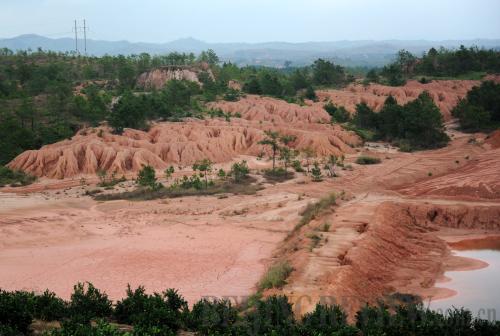|
 |
|
SCAR ON THE EARTH: Unauthorized mining of rare earth makes the land bare, allowing desertification to spread in Xinfeng, Jiangxi Province (ZHOU KE) |
Disputes surrounding China's rare earth industry are hardly rare. Domestically, the industry was plagued by environmental pollution and fragmented mining operations. Internationally, China's implementation of an export quota system on rare earth has triggered trade frictions.
A newly established nationwide rare earth association may become a helping hand to the government in solving these disputes.
On April 8, the China Rare Earth Industry Association was set up in Beijing. The association, consisting of 155 members that include industry giants Aluminum Corp. of China (Chalco) and China Minmetals, was formed to promote sustainable and sound development in the sector, said Su Bo, Vice Minister of Industry and Information Technology (MIIT) which governs the association.
The establishment of the association is considered a move to accelerate consolidation of the sector and help deepen international communication and properly handle trade disputes.
But the association will not be a cure-all remedy. Analysts doubt whether the association could produce a unified voice with 155 members and consolidation efforts may not pay off as expected because of too many different interest concerns.
The establishment of the rare earth industry association is the culmination of widespread market speculation that China would come up with an organization to monitor and regulate the sector's activities, especially rampant illegal explorations.
In order to regulate the largely unauthorized exploration for rare earths that has led to increased smuggling operations, China adopts production caps and export quotas.
"We cannot follow the path of predatory mining in the rare earth industry any longer, nor can we continue to sell rare earth into domestic and foreign markets at unreasonably low price," said Zhang Weichen, an expert of the Chinese Academy of Land and Resources Economics.
But China's efforts to protect its rare earth industry and environment seemed to irritate international buyers. On March 13, China received negotiation requests put forward by the EU, United States and Japan on the export management measures of rare earth, wolfram, and molybdenum under the WTO's dispute-settlement system.
The establishment of the association is the result of the case filed by the EU, United States and Japan with the WTO, Du Shuaibing, an analyst with Beijing-based Baiinfo, an industrial research agency, told the Global Times. Trade associations in other countries are playing a leading role in interacting to the common benefit of the whole industry and providing a unified voice to lobby.
The establishment of the association is also considered a move to accelerate consolidation of the sector.
"Developing an industrial pattern led by several big businesses via merger and acquisition (M&A) and restructuring has become the direction of reform in the rare earth industry," said Lin Boqiang, Director of the China Center for Energy Economics Research in Xiamen University.
M&As and restructuring have been in full swing this year, led by Chalco, China Minmetals, China Nonferrous Metals Mining, Baotou Steel Rare Earth and Ganzhou Rare Earth.
This year China will focus on cracking down on illegal mining, production and smuggling of rare earth, said Su at the launching ceremony of the association. China will not accept new application of mining of rare earth resources. Mining and smelting enterprises will no longer be allowed to expand their production capacity.
"The association will not only do its best to explain the country's rare-earth policies but also take the responsibility of protecting the environment," Su said.
Rare earth minerals are a group of 17 elements which are mainly used in manufacturing hi-tech products, such as solar panels, electric or hybrid vehicles, wind turbines, consumer electronics and other clean energy technologies.
| 